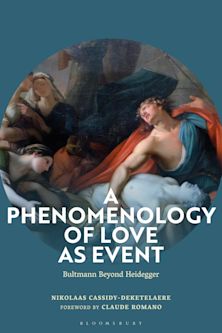The Revelatory Power of Mimetic Theory
Reading René Girard, Texts and the World
The Revelatory Power of Mimetic Theory
Reading René Girard, Texts and the World
Description
A one-of-a-kind overview of the lasting impact of mimetic theory and the extent of its interdisciplinary applications, a century after René Girard's birth.
Bringing together a team of established scholars from different disciplines, this collection assesses how much the theory has developed over Girard's lifetime and beyond. Literary texts and myths are analysed through a mimetic lens, revealing the underlying patterns of rivalry, violence, and sacrifice. Mimetic theory is then applied to real-world phenomena, such as terrorism, social conflict, and ecological crises, demonstrating its relevance in the 21st century.
Each chapter collected here demonstrates mimetic theory's on-going capacity to open up new avenues in philosophy, disability studies, literature and beyond. Girard argued that texts, whether religious, literary, or anthropological reveal fundamental aspects of the world. Inspired by this chapters drawing on a rich selection of works and authors including DH Lawrence, Oedipus Rex, Hannah Arendt, and Michel Houellebecq to reveal innovative uses of his theory.
By illustrating how Girard's ideas are being used by specialists and practitioners across diverse fields, this expansive exploration of mimetic theory tackles timely topics from social media and terrorism prevention to toxic masculinity and conspiracy theories. It is for anyone interested in understanding human behavior and culture from multiple perspectives.
Table of Contents
Introduction: B. Chantre
René Girard: Death and Resurrection
Part I Reading texts:
1 Mark Anspach (Independent scholar)
Oedipus and the evolution of the scapegoat hypothesis
2 Ethan Blass (Wartburg College)
Comparative Methodology and Seeing the Victim
3 William Johnsen (Michigan State University)
The “Missing Mother” and the continuing Fecundity of René Girard: Depaternalisation and the Dedomestication of Women in Modern Writing
4 Steve McKenna (Independent scholar)
“An expression significantless and without past”: History, Language, and the Sacrificial Structure of Near-Lynching in Faulkner's Intruder in the Dust
5 Simon de Keukelaere (Catholic archdiocese of Vienna)
Does reading Girard make your life worse? Mimetic desire, literature and the desire for God.
6 Johann Rossouw (University of the Free State – South Africa)
René Girard, Michel Houellebecq and mimetic rivalry in the liberal consumerist society
Part II Reading the World
7 James Alison (Independent scholar)
Humility: a loser's virtue, the route to reality, or both?
8 Barbara Carnevali (École des Hautes Études – Paris)
Deviated Transcendence: Girard's Legacy for Social Philosophy
9 Vincent Delecroix (École des Hautes Études - Paris)
Cain and Abel
10 Elisabetta Brighi (University of Westminster)
Towards a Mimetic and International Political Theory of Terrorism?
11 Chris Fleming (Western Sydney University)
Images, Emotions, and Moral Reality
12 Andreas Wilmes (Pazmany Péter Catholic University)
Violence: Sketch for a History of Ideas
13 Jean-Pierre Dupuy (Standord University)
The looming nuclear war
14 Alan Cork (Independent scholar)
Mimetic Theory and L'Arche
15 Luca Guglielmimetti (European Radicalization Awareness Network)
What Are Girardian Persecution Texts If Not What We Now Call Conspiracy Theories?
Their Legacy In Manzoni's Work And In Crime Prevention
16 Julien Lysenko (Independent scholar)
René Girard, thinker of the Apocalypse
Can Truth triumph over Reality?
17 Susan McElcheran (University of Toronto)
Intellectual Disability Studies and Mimetic Theory
Emerging Connections
18 Vincent Riordan (Psychiatrist, West Cork Health Services)
Applications of Mimetic Theory to Psychiatry
Past, Present, and Potential for the Future
19 Favbrizio Arcuri (University of Bergamo)
The Manosphere: A Case of Mimetic Resentment
20 Ivan Blecic (University of Cagliari) & Paul Dumouchel (Université du Québec à Montréal)
Towards Modelling Mimetic Theory: An Agent-Based Simulation
Product details

| Published | 11 Dec 2025 |
|---|---|
| Format | Ebook (Epub & Mobi) |
| Edition | 1st |
| Extent | 240 |
| ISBN | 9781350532892 |
| Imprint | Bloomsbury Academic |
| Series | Violence, Desire, and the Sacred |
| Publisher | Bloomsbury Publishing |
Reviews

ONLINE RESOURCES
Bloomsbury Collections
This book is available on Bloomsbury Collections where your library has access.



































